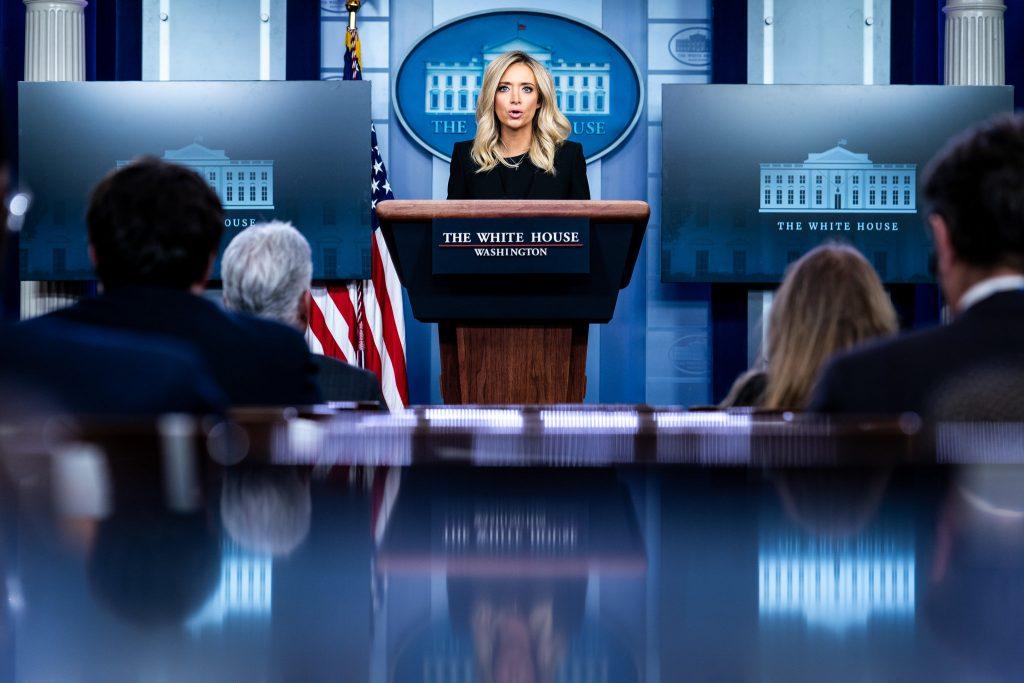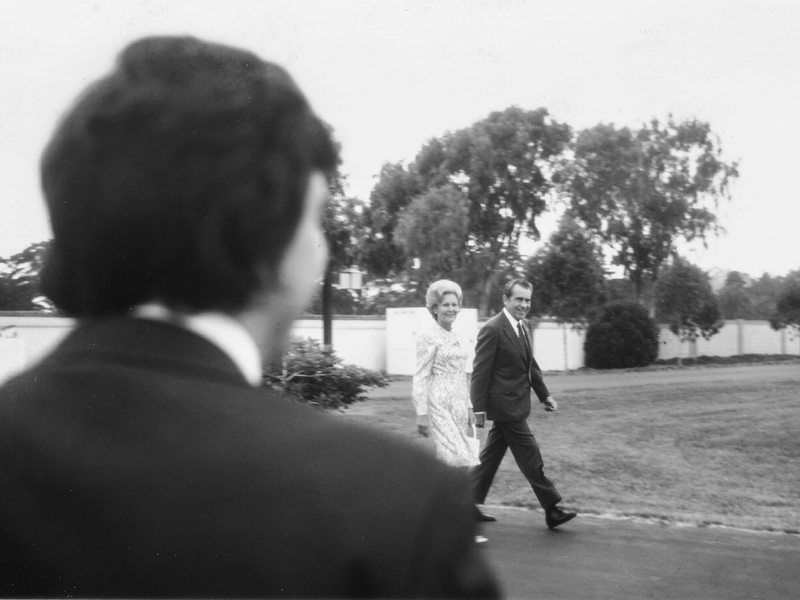And we know that in all things, God works for the good of those who love Him, who have been called according to His purpose.
Romans 8:28
What happens to a genre when it is murdered but then comes back from the grave?

After more than a year of darkness and silence, the lights of the White House Press Briefing Room, without much warning, turned back on. The flat fluorescent light reveals the shadowless theater once again. Once again, video cameras have started to record the dialogue, as the discursive engines rumble back to life. In some ways, everything is the same as it ever was.
When journalists take their seats for another iteration of the spectacle, this time it is harder for us to see the expression on their faces, for they are masked and sitting six feet apart. The pandemic is still very much with us, in spite of what is being said.
A new actor has reprised the role of White House Press Secretary, one Kayleigh McEnany, stunt double for the President’s eldest daughter, or his alternative factician, KellyAnne Conway. Near anagrammatic matches for one another, you note when you’ve shot too much tequila, hoping to cope.
Like her predecessors, she speaks in mashups of patriotic and biblical tropes. She’s earned her stripes in all of the right places: the Huckabee show and One America Network, aka Trump TV, the station that satisfies the itch when Fox fails to scratch. But Kayleigh McEnany holds a unique hand that her predecessors lacked, even on their best days, which elevates her style and gives it a pass that’s very difficult to check. She’s earned a Harvard law degree and her chops in the conservative media. She has the unflinching polish that’s honed in the hallowed halls and the reality defying, dogged persistence of a Tucker Carlson.
Is Kayleigh McEnany’s briefing room a chamber of divine resurrection? Or a theater of unholy resuscitation? Either way, she’s mutated the genre. It is stronger, more invincible. Less vulnerable to inquiry. More efficient in its messaging, less susceptible to human emotion. Less fractious, more tenacious in its grasp of spare, mythic storylines, which are peopled with heroes and villains, police and anarchists, order and chaos. Kayleigh’s world has been purged of ambiguity, and therefore she is entirely free to embrace a stark, binary zeitgeist, which naturally falls lockstep in party lines.
“And we know that in all things, God works for the good of those who love Him, who have been called according to His purpose.” Kayleigh opened a recent briefing with this quotation from the New Testament, which was meant to offer solace to the families of police officers who died during Black Lives Matter protests in June. But the citation performs more subtle rhetorical labor as well. It makes a distinction between those who love God and, unspoken but implied, those who don’t. Those who have been called to his purpose and those who haven’t. Those whose deaths have redemptive meaning, like the police, and those deaths, like George Floyd’s and far too many more, whose meaning is now fought for in the streets.
The force of Kayleigh’s rhetorical style comes from a most unsettling blend of qualities. Religious Fervor. Her delicate cross graces every neckline, a sign pointing to the law beyond our laws. Both sword and armor, this talisman takes the media general to battle for the message of our heavenly father. Direct Address of the Base. Her storylines are always crafted to shore up the courage of crusading believers, who are rewarded with narrative glow. Speaking of new trade deals, she closed one briefing with this: “Under President Trump, the forgotten man and woman of America is forgotten no longer.” Socratic Method. Or at least its simulation. Hybrid Harvard legal eagle and Sunday school teacher, Kayleigh calls upon everyone who has a question and wants to participate, making sure that turns are taken in an orderly way, according to a seating chart she has at hand for quick reference. She knows where the troublemakers sit, and she knows where the lobs lie, scanning the room for narrative pulses, plotting the arcs and shutting the briefing down on some carefully prepared bit of mythology: a resting note she knows she’ll play from the very first words she speaks.
One such coda ended a recent briefing, somewhat abruptly, when reporters pressed McEnany about whether the President himself had been briefed by his national security team about bounties placed by Putin on the heads of American soldiers in Afghanistan. McEnany threw down, to a room of journalists, a base-bound herring, for red consumption only: that the New York Times, which broke the bounty story, give back its many Pulitzer Prizes. In spite of what McEnany has repeatedly said about lack of consensus in the intelligence community, the story now has multiple outlets chasing down the facts: the President really did know, and has known for quite some time, what’s been going down.

If White House Press Secretaries have a patron saint of lost causes, that sorrowful honor surely belongs to Ronald Louis Ziegler, who served as Richard Nixon’s mouthpiece for five long years. Through Vietnam. Through Watergate. At the end, Zeigler was the only remaining staffer to sit with Nixon as the disgraced president’s helicopter lifted off from the White House lawn. He took pride in this peculiar honor. He was proud, even though Nixon had frequently berated him, to his face and behind his back, for not selling enough units of propaganda. Proud, even though Nixon had once physically shoved him, in public, and in the direction of some gathered reporters, no less. None of this mattered. Zeigler remained the Chief’s most steadfast paladin.
And the punishment wasn’t just dropped on him by the Chief upstairs. He had to go out, over and over, to face a room full of people with pens and pads of paper, microphones and cameras, who subjected him to logical discourse and for whom his opaque replies were almost invariably unsatisfactory, if not inflammatory. At his frequent congressional grillings, the smell of futility and failure seemed to rise from him. His responses to questions were so frequently tongue-tied and hollow, even he sometimes seemed to recognize the inadequacy of his on-the-fly word-pretzels.
“If my answers sound confusing, I think they are confusing because the questions are confusing and the situation is confusing–and I’m not in a position to clarify that.”
Another gem:
“The President is aware of what is going on in Southeast Asia. Not that anything is going on in Southeast Asia.”
No wonder Zeigler won an award from the National Council of English Teachers for outstanding achievement in “doublespeak.”
Eventually, he apologized for his role in Nixon’s prolonged con job. Showing a little mercy, Ben Bradlee, the editor of The Washington Post, accepted the apology and then, liberally mixing his own metaphors, went on to describe Zeigler as “a small-bore man, over his head, and riding a very bad horse.” True enough. He was only 29 when he became the first person to grip the podium in the now famous, newly unveiled White House Press Briefing Room. He had no background in journalism. Prior to his ascension to the role of one of the country’s most high-profile storytellers, he had been a minor advertising executive, and, as the press would so happily remind him at every opportunity, a narrating skipper at Disneyland’s “Jungle Cruise,” firing blanks at animatronic hippos rising from of the waters of Anaheim.
The creatures swimming around and waiting for him in the Press Briefing Room, were not so easily subdued, of course. He dodged the truth and lied and they made him look like a fool. So how did the blank-headed helmsman manage to stay standing, swaying at the podium through so many sea-sickening storms?
He stayed because he was malleable. Because he did as he was told. Because no one in the administration had reason to fear him. He said nothing of consequence and in turn he was of no consequence, himself. Nixon’s communications brain trust–William Safire, Pat Buchanan, Roger Ailes, and H.R. Haldeman, among others–were in fact already busily imagining a world where the job of the Press Secretary wouldn’t only be irrelevant: it wouldn’t even exist. The Chief, after all, had succinctly put it to Henry Kissinger: “…the press is the enemy. Write that on the blackboard one hundred times.” But how to vanquish such a hungry, omnipresent foe? The members of the brain trust would have preferred to banish the whole rotten crew from the press room altogether, but knew–drat!–that this might look like vulnerability, like weakness, like fear of getting a little bloody in the ring. But there was another way to make the Chief happy. The trick, as they saw it, was to develop the President’s own television channel, a channel where the Chief could talk directly to the people who elected him without, according to Buchanan, “a gaggle of commentators raising doubts.”
As we know, in time, that dream of brain-to-brain transmission came to pass, more or less. America eventually got some simulacrum of state-sanctioned media, thanks to Ailes, where a president could indeed talk directly and maybe only to the people who elected him, cheered on by a gaggle of well-paid sycophants who’d rather be called “personalities” than “journalists.” Had this novel information apparatus held stock in the briefing room, it could have thrown a much-needed rope to poor old Zeigler, who was so clearly drowning in his own verbal bathwater.
Which brings us back to McEnany, who deftly makes her predecessors look like tongue-tied amateurs. The Fox-induced echo chamber accounts for only part of her success. Sean Spicer leaned heavily on Fox, before he ended up in the bushes. So did the Mooch and Sarah Huckabee Sanders. The megawatt cheerleading squad would have been there for Stephanie Grisham, too, had she been allowed to turn the lights on in the press room. Although all of them surely wanted to take swings from the President’s amen corner–they were just as faithful as Nixon’s press secretary–they nevertheless hamstrung themselves in exactly the same way as the hapless, sucker-punched Ziegler had done.
Will Kayleigh’s holy mutation of the press briefing genre hold back the unruly heathens at the White House gate, the violent anarchists and the angry mob, the socialists and the journalists, the Washington Post and the New York Times?

